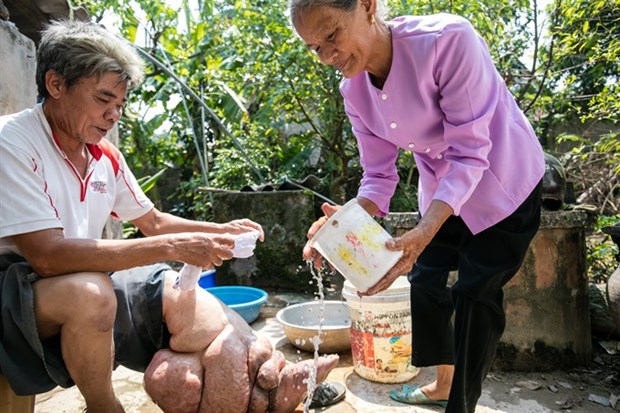Vietnam eliminates lymphatic filariasis
The World Health Organisation (WHO) has announced that Vietnam has eliminated lymphatic filariasis as a public health problem.
 A patient washes his leg, which is swollen from lymphedema caused by lymphatic filariasis.— Photo RTI International
A patient washes his leg, which is swollen from lymphedema caused by lymphatic filariasis.— Photo RTI InternationalHanoi (VNA) - The World Health Organisation (WHO) has announced that Vietnam has eliminated lymphatic filariasis as a public health problem.
According to the WHO, lymphatic filariasis is an infection transmitted to humans by mosquitoes.
The painful and profoundly disfiguring visible manifestations of the disease – lymphoedema, elephantiasis and scrotal swelling – occur later in life and can lead to permanent disability.
Patients are not only physically disabled but also suffer mental, social and financial losses contributing to stigmatisation and poverty.
WHO said elimination of lymphatic filariasis is possible by stopping the spread of infection through large-scale treatment (called mass drug administration) delivered in annual doses to all at-risk individuals in endemic areas.
The medicines have a limited effect on adult parasites but effectively reduce the density of microfilariae in the bloodstream and thus prevent the spread of parasites to mosquitoes.
The WHO also said that in Vietnam, references to the disease go back more than a century. The prevalence of infection gradually declined in many areas through environmental changes, improvements in housing, increased use of bed nets and selective treatment.
Annual mass treatment campaigns between 2002 and 2008 stopped transmission in remaining endemic areas, and surveillance has continued. Last year, the country established a pioneering new training programme to ensure sustained care for people with complications from lymphatic filariasis.
Besides Vietnam, Palau, and Wallis and Futuna have eliminated lymphatic filariasis.
Since the WHO launched the Global Programme to Eliminate Lymphatic Filariasis in 2000, a total of 11 countries and areas in the Western Pacific Region have been recognised for eliminating lymphatic filariasis as a public health problem: Cambodia, China, Cook Islands, Niue, the Marshall Islands, Palau, the Republic of Korea, Tonga, Vanuatu, Vietnam, and Wallis and Futuna. – VNA












